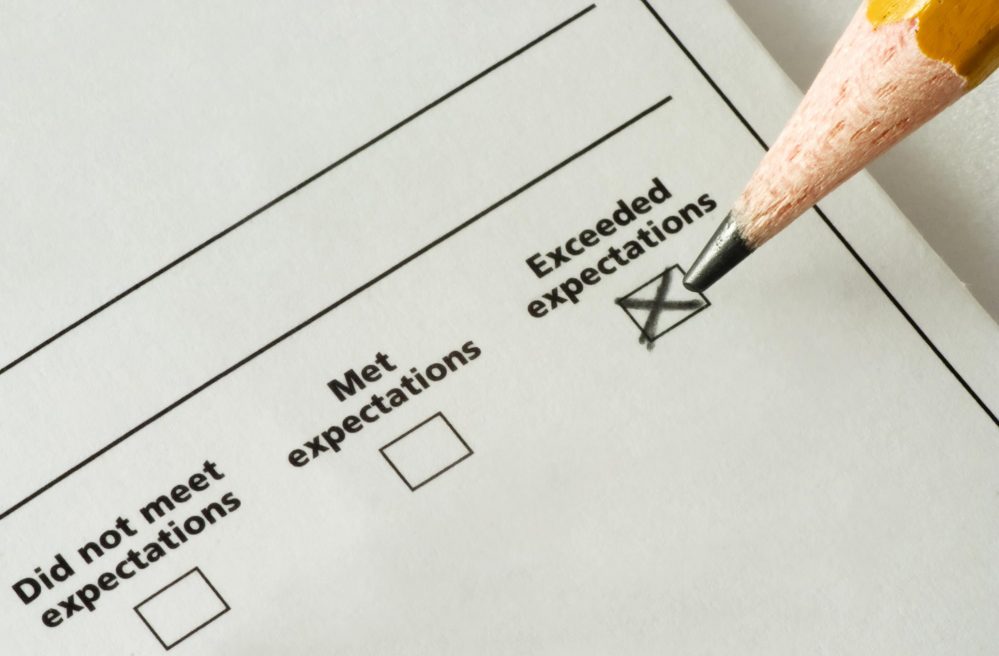As customer-driven companies, our prime objective is to meet or exceed customer expectations. We want to do this by putting ourselves in the position that our actions – not our words – are what delight the customer. In everyday life, I notice that people promise things or indicate that something will happen, but they don’t deliver, and it’s frustrating. I’d rather they be upfront and tell that it won’t happen instead of expecting that it will or having to calibrate myself that the person can never be relied upon.
Everyone has heard about exceeding customer expectations, but it starts at the front line with the first conversations with the customer. If expectations are set low enough, the opportunity to exceed expectations is maximized.
The message I teach the employees at Seeq is that one should always put oneself in a position where actions delight the customers and not just the words. This means that you have to communicate openly, honestly, and sometimes maybe even a little pessimistically to ensure that your efforts are what please the customer. My comment is that words are nice, but they have nowhere near the impact of actions. So, when a customer asks you something, and you overpromise, that may initially make them feel good, but they will never forget when you don’t deliver. And, if you provide outstanding results as promised, they will remember that you merely met the expectations of your initial words and promises.
In reality, this concept is hard to implement because when someone asks you to do something, you almost always want to say whatever you can to make them happy at first concept. This approach requires lowering their expectations during initial conversations rather than saying things to make them happy at the time of the request.
Delighting your customers with your actions is an order of magnitude more powerful than making them happy with your words. So, pick your words carefully so that your actions can achieve this goal.Steve Sliwa
Case Study
It’s Monday morning, and your customer calls you and says that they absolutely have to have a deliverable by Friday. You consult the appropriate team, and they say, “With luck, we are 90% likely to meet this deadline.” What do you tell the customer?
Not long ago, I used this content in a training session at Seeq. At this point in the presentation, I gave them a quiz on their smartphones. This question was the first I asked:
What should you tell the customer?
- Good news! The deliverables will arrive on Friday guaranteed.
- Good news! The deliverables are likely to arrive on Friday.
- Good news! With a little luck, we should be able to get it there by Friday, but Monday at the latest.
- Sorry to tell you this, but we are trying hard, but the deliverable may not arrive before a week from Friday.
Most people chose Option 3, but the best answer is Option 4. Let’s look at each in detail.
Option 1 initially delights the customer, even though you gave the likelihood of it happening at about 60%. “Luck” and 90% do not really go together, so you put the chances at about 60%. In telling the customer that it will definitely arrive on time, you have no upside, meaning you can’t impress the client because you’ve already promised it. You can only meet expectations or disappoint if you fail to deliver.
Option 2 really sets the same expectations in the customer’s mind. More often than not, they will skip over the word “likely.” You have the same risks as Option 1 without the initial excitement from the customer.
Option 3, which most people chose, still involves risk. Essentially, you are only buying an additional day, but the customer will be disappointed if the delivery doesn’t happen on Friday, and again, there is less initial excitement.
Option 4 will initially disappoint the customer, and they may even be angry. They really want it by Friday, and you are saying that it will be one week later. While this looks bleak, you will meet the delivery date that you set. If you deliver early, you will delight the customer.
As I said, in Option 4, the customer could be mad. So, I have a follow-up question that I ask my employees.
You tell the customer a week from Friday. S/he is very upset and disappointed. What should you say now?
- We will try hard for Friday, and we will do our best to make it.
- We will try hard for Friday, and with a little luck, we will make it.
- I was given an estimate of 90% by Friday, so you should be able to rely on that.
- We are working as hard as we can, and it will be hard to beat a week from Friday. Our team is brilliant and innovative. If they can find a way to beat a week from Friday, I bet they will do it.
Options 1, 2, and 3 are backing off your original statement and estimate. If you deliver on Friday, you are only meeting expectations. And if you are late, they will still be upset. There is no upside.
With Option 4, you stick to your guns. If you deliver by Friday, then you make the actions seem even more brilliant. You can tell the customer, “I told the team how important this was to you, so we adjusted priorities, and put some of our best people on it so that we could deliver it by Friday. You are valuable to us. I hope you appreciate the effort we made for you.”
In this case, you have a great chance of having a happy customer, even if you deliver a couple of days past Friday. Yes, you took a hard hit initially by not using the easy words, but this will have a long-lasting effect.
Actions speak louder than words.
Share this Post

